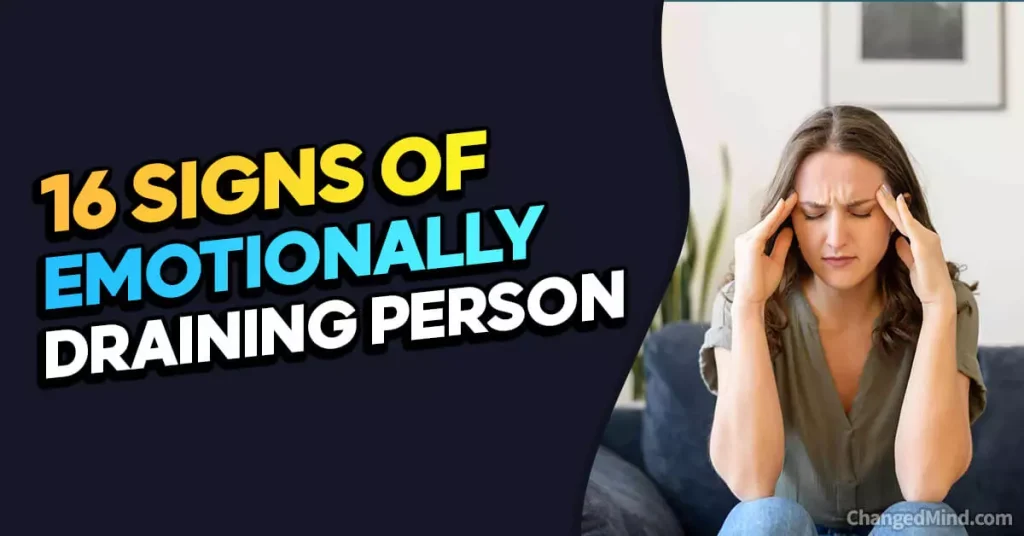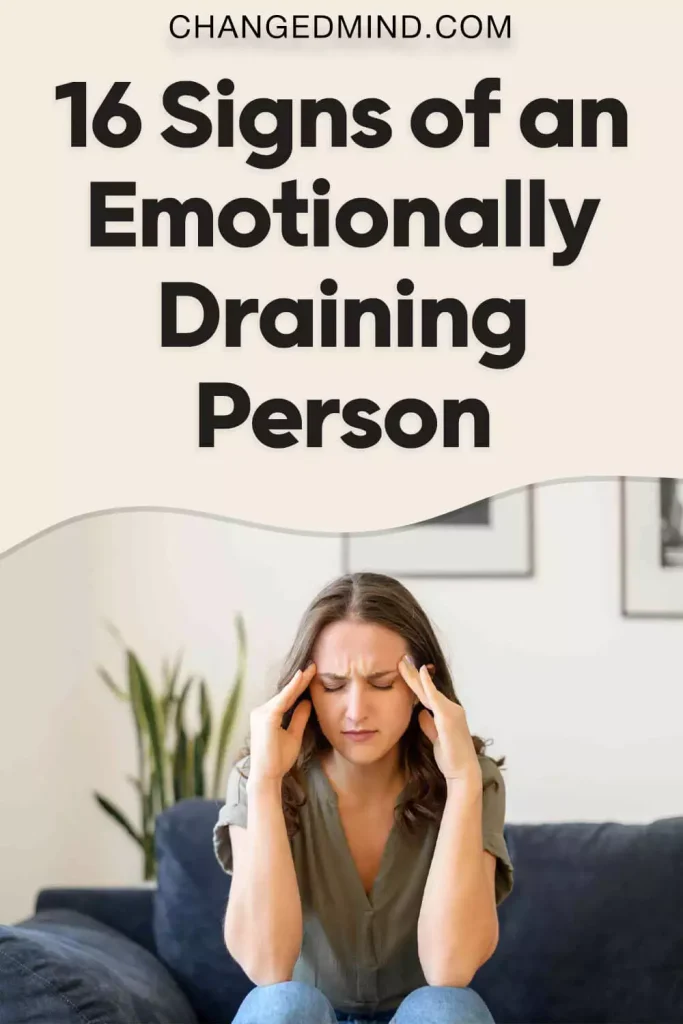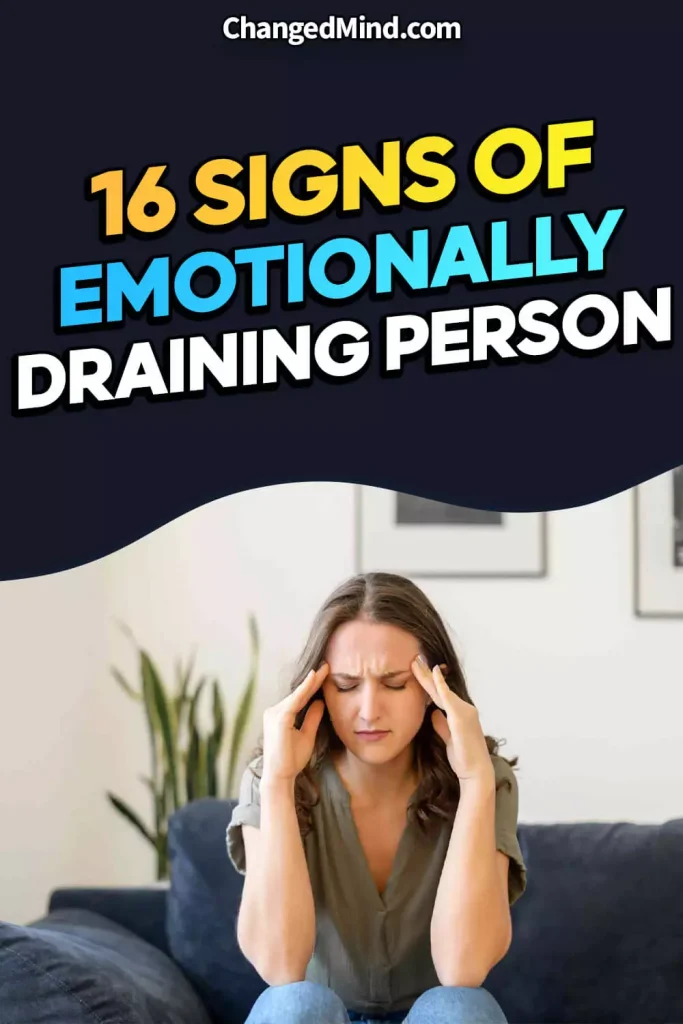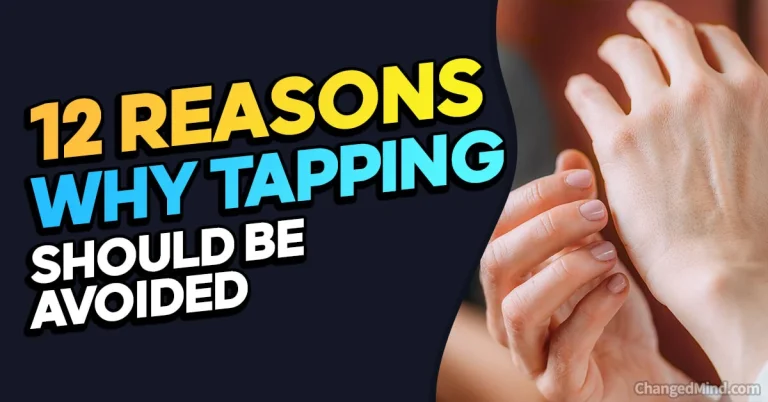Ever met someone who leaves you feeling more wrung out than a wet towel in a monsoon? Oh boy, we’ve all encountered that special someone – the human embodiment of an emotional black hole. Yes, you guessed it right, we’re diving into the wild world of “Signs of an Emotionally Draining Person.”
Buckle up, because we’re about to decode those subtle SOS signals your energy reserves send you when you’re caught in the clutches of such a person. From mysteriously disappearing enthusiasm to mastering the art of emotional guilt-tripping, this article spills the beans on every telltale sign that screams, “Warning: Draining Person Ahead!”
But don’t fret – we won’t just leave you hanging with the diagnosis. We’ll arm you with strategies to navigate these murky waters and protect your precious energy. Ready to spot emotional vampires from a mile away? Let’s roll! 🦇
Short Answer: Ever wondered why some folks zap your energy faster than a smartphone on low power mode? Brace yourself as we uncover the “Signs of an Emotionally Draining Person.” Get set to spot these energy vampires and discover how to shield yourself from their emotional grip.
In this article, we’ll cover:
- The sneaky art of emotional manipulation.
- The disappearing act of your enthusiasm.
- How to identify guilt-trip tactics.
- Setting up your emotional defense shield.
- Navigating draining dynamics with finesse.
Emotionally draining people can have a significant impact on our mental and emotional well-being. Understanding the traits and behaviors of such individuals is essential in identifying and managing these draining relationships.
Here, we will explore the traits that define an emotionally draining person and the impact they can have on your overall well-being. We will also provide strategies for effectively dealing with such individuals and self-reflection to assess if you exhibit any of these draining traits.

Emotional drain refers to the exhaustion and depletion of emotional energy caused by prolonged interactions with certain individuals. Identifying the traits that characterize an emotionally draining person is key to protecting yourself. These traits include constant negativity, excessive drama, unresolved emotional baggage, lack of empathy, manipulative behavior, neediness and dependency, and an inability to establish boundaries.
Being around emotionally draining people can take a toll on your well-being. It can lead to emotional exhaustion, increased stress levels, reduced self-esteem, strained relationships with others, and hindered personal growth.
To effectively deal with emotionally draining people, setting clear boundaries is crucial. Practicing self-care, communicating effectively, seeking support from others, and considering distance and limiting contact are also essential strategies.
It is important to engage in self-reflection to assess if you exhibit any of these draining traits yourself. Recognizing and addressing your own behaviors can help improve your relationships and overall well-being.
By understanding the traits of emotionally draining people, their impact on your well-being, and implementing effective coping strategies, you can navigate these relationships more effectively and protect your emotional energy.
Key takeaway:
- Constant Negativity: Emotionally draining people often exhibit a consistent negative mindset, which can drain your own energy and impact your well-being.
- Excessive Drama: These individuals tend to create or thrive on unnecessary drama, causing stress and emotional exhaustion for those around them.
- Lack of Empathy: Emotionally draining people often struggle to show empathy and understanding towards others, leading to strained relationships and reduced self-esteem.
16 Signs of an Emotionally Draining Person (And How to Fix It)
- Constant Negativity: They see the dark clouds even on a sunny day. Solution: Encourage a positive perspective and set boundaries.
- Drama Magnet: Drama follows them like a loyal pet. Solution: Refrain from getting drawn into their theatrics.
- Endless Complaints: Nothing’s ever right. It’s a never-ending whine fest. Solution: Suggest focusing on solutions rather than complaints.
- Energy Vampires: They suck the life out of you, leaving you drained. Solution: Limit exposure and prioritize self-care.
- Manipulative Guilt-Tripper: They’re masters of emotional blackmail. Solution: Stand firm, and don’t let guilt dictate your choices.
- Always the Victim: They attract problems like a magnet but never take responsibility. Solution: Encourage self-reflection and accountability.
- Attention Cravers: They demand attention like it’s their oxygen. Solution: Offer attention in healthy doses, while maintaining your space.
- Constant Critic: Nothing you do is good enough. Solution: Set boundaries and communicate your feelings assertively.
- Jealousy Incarnate: Your successes fuel their envy. Solution: Celebrate your wins, and encourage their growth.
- Draining Conversations: Every talk turns into an emotional ordeal. Solution: Guide conversations toward positive and constructive topics.
- Emotional Rollercoaster: Their moods swing more than a pendulum. Solution: Be empathetic but encourage seeking professional help if needed.
- Boundary Breaker: They invade personal space without hesitation. Solution: Establish clear boundaries and reinforce them consistently.
- Chronic Pessimist: They believe the glass is always half empty. Solution: Share your optimism and help them see alternate perspectives.
- Never Apologizes: They’re allergic to saying sorry. Solution: Lead by example, showing the power of a sincere apology.
- Overly Dependent: They lean on you for emotional support non-stop. Solution: Encourage them to diversify their support network.
- Resists Change: They’re stuck in their ways, refusing to adapt. Solution: Gently introduce the benefits of flexibility and growth.
Remember, you can’t change others, but you can control how you react. Choose self-care and healthy boundaries to thrive even in draining dynamics.
Understanding Emotional Drain
Emotional drain can leave us feeling exhausted, overwhelmed, and drained of energy. In this section, we’ll dive into the depths of understanding emotional drain and unveil its effects on our well-being.
Delving into emotional drain defined, we’ll unravel the underlying causes and shed light on how it impacts our relationships and daily lives. Brace yourself for an insightful journey that will empower you with knowledge to navigate emotional drain with resilience and self-care.
Emotional Drain Defined
Emotional drain, also known as emotional exhaustion, is the result of interacting with emotionally draining individuals. These individuals possess specific traits and behaviors that have a significant impact on one’s well-being and mental state. Understanding emotional drain is crucial in identifying and addressing its effects.
1. Constant Negativity: Emotionally draining individuals typically have a pervasive negative attitude. They fixate on what is wrong, depleting the energy and optimism of those around them.
2. Excessive Drama: These individuals thrive on creating and perpetuating drama in their lives. They blow minor issues out of proportion, causing unnecessary stress and emotional turmoil.
3. Unresolved Emotional Baggage: Emotionally draining people often carry unresolved emotional pain from their past. This pain can manifest as repetitive behavior patterns, affecting their interactions with others.
4. Lack of Empathy: They struggle to understand and empathize with the feelings and experiences of others. Their inability to provide emotional support and connection can be emotionally draining.
5. Manipulative Behavior: Emotionally draining individuals may employ manipulative tactics to gain control or exploit others. Their manipulative behavior can leave others feeling emotionally drained and manipulated.
6. Neediness and Dependency: They constantly seek attention, validation, and support from others. Their excessive neediness can be overwhelming and deplete the emotional resources of those around them.
7. Inability to Establish Boundaries: Emotionally draining individuals struggle to comprehend and respect personal boundaries. They may invade personal space or consistently overstep boundaries, leading to emotional exhaustion.
Recognizing and understanding emotional drain and its defining characteristics are vital for effectively navigating relationships. By identifying these traits, individuals can safeguard their emotional well-being. It is important to establish clear boundaries, prioritize self-care, communicate effectively, seek support when necessary, and consider limiting contact with emotionally draining people.
These measures can help individuals cope with the effects of emotional drain and foster healthier relationships. Identifying the traits of an emotionally draining person: spotting constant negativity is like finding a needle of drama in a haystack of unresolved emotional baggage, all wrapped up in a lack of empathy, manipulative behavior, neediness, and an inability to establish boundaries.
Identifying Traits of an Emotionally Draining Person

Unraveling the characteristics of an emotionally draining person, let’s dive into the essence of identifying these toxic traits.
From constant negativity and excessive drama to unresolved emotional baggage, lack of empathy, manipulative behavior, neediness, dependency, and an inability to establish boundaries, we’ll traverse the terrain of what makes these individuals emotionally draining.
Brace yourself for a revealing exploration of the signs that may be lurking within your relationships or even within yourself.
Constant Negativity
Constant negativity is a trait commonly found in emotionally draining individuals. It refers to a persistent negative attitude and outlook on life. People who exhibit constant negativity tend to focus on the negative aspects of any situation and share these thoughts and emotions with others. This negativity can significantly impact both their own well-being and the well-being of those around them.
When dealing with someone who exhibits constant negativity, it’s important to recognize the toll it can take on your own emotional state. Constant exposure to negative energy can lead to emotional exhaustion, increased stress levels, and reduced self-esteem. It can also strain relationships and hinder personal growth.
To handle constant negativity, it’s crucial to set clear boundaries. By establishing boundaries, you can protect your own well-being and prevent the negativity from affecting your life. Clearly communicate your needs and limits to the individual, making it known that constant negativity will not be tolerated.
In addition to setting boundaries, practicing self-care is crucial to counteract the negative impact of constant negativity. Engage in activities that promote self-care, such as exercise, relaxation techniques, and pursuing hobbies. These activities can improve your ability to cope with the challenges it brings.
Effective communication is another valuable tool when dealing with constant negativity. Express your feelings and concerns openly and honestly, while also actively listening to the other person’s perspective. Through effective communication, you may help the individual gain self-awareness and recognize the impact of their constant negativity on themselves and others.
Seeking support from friends, family members, or a therapist can be beneficial when dealing with constant negativity. They can provide valuable insight and guidance on how to handle the situation, offer support, and help you navigate the challenges of dealing with emotionally draining individuals.
Considering distance and limiting contact may be necessary when constant negativity becomes overwhelming. It’s important to prioritize your own well-being. Taking a step back and limiting interaction can be a healthy choice.
Get ready for a front row seat to a never-ending soap opera, as we dive into the world of excessive drama.
Excessive Drama
Excessive drama drains people emotionally. Dealing with it can be exhausting and detrimental. Here are key aspects to consider:
1. Attention-seeking: Emotionally draining individuals crave constant attention. They create and escalate drama to stay at the center of attention.
2. Lack of self-awareness: People who engage in excessive drama often lack self-awareness. They don’t realize how their actions impact others or contribute to the drama.
3. Repetition of drama: Emotionally draining individuals tend to repeat the same drama. They bring up past issues or create new conflicts without resolving them.
4. Unrealistic expectations: These individuals have unrealistic expectations of how others should behave or respond to their drama. They expect constant validation, support, or sympathy without considering others’ needs and boundaries.
5. Emotional triggers: Emotionally draining people know how to trigger negative emotions in others. They push buttons and manipulate situations for strong emotional responses.
6. Energy vampires: Excessive drama drains the energy and emotional well-being of those involved. These individuals constantly suck the positive energy out of others.
7. Conflict personalities: Emotionally draining individuals often seek or create conflicts. This leads to a never-ending cycle of drama.
8. Emotional burden: They struggle to manage their own emotions and pour them onto others. They expect others to bear the burden of their emotional turmoil.
9. Imbalanced energy: Excessive drama creates an emotional energy imbalance in relationships. The draining person consumes more emotional energy, leaving others feeling depleted.
Dealing with excessive drama requires setting boundaries, self-care, and effective communication. Recognize when drama becomes overwhelming and protect your well-being. Seek support from others and consider distance or limiting contact with emotionally draining individuals.
Unresolved Emotional Baggage
Unresolved emotional baggage is a prominent characteristic of individuals who are emotionally draining. It pertains to previous emotional issues or traumas that have yet to be resolved. These emotions can continue to impact the individual and those around them, resulting in ongoing strain and difficulties in relationships.
One of the reasons why unresolved emotional baggage is draining is because it leads to repetitive patterns of behavior and emotional conflicts. The individual may consistently bring up past problems, creating a negative emotional environment. This repetition of unresolved issues can be tiring and exhausting for everyone involved.
Additionally, unresolved emotional baggage can lead to unrealistic expectations and a lack of self-awareness. The individual may struggle to comprehend their own emotions and their effects on others. They may also have difficulty handling problems in a healthy manner, often resorting to expressing their emotions or seeking unhealthy attention.
Moreover, unresolved emotional baggage can contribute to a victim mentality. The individual constantly feels wronged and tends to blame others. This can create conflicts in relationships and hinder personal growth.
To address someone who has unresolved emotional baggage, it is crucial to encourage them to seek therapy or counseling to tackle their past traumas and work towards healing.
Setting clear boundaries is also important in order to safeguard your own emotional well-being. It might be necessary to limit contact or distance yourself from the individual if their unresolved emotional baggage is negatively impacting your mental health.
Lack of Empathy
Empathy is the ability to understand and share the feelings of others. When someone lacks empathy, they are unable to connect with or understand the emotions of those around them. This can impact their relationships and the well-being of those who interact with them.
1. Inability to understand others’ perspectives: Those lacking empathy struggle to understand other people’s points of view, dismissing or invalidating their feelings. This strains relationships and erodes trust.
2. Self-centered behavior: People lacking empathy focus solely on their own needs and desires, disregarding others’ feelings and needs. This neglect and frustration can damage relationships.
3. Difficulty providing emotional support: Emotionally draining individuals find it challenging to offer comfort and understanding during difficult times due to their lack of empathy. This leaves loved ones feeling isolated and emotionally drained.
4. Failure to recognize the impact of their actions: Without empathy, individuals fail to recognize how their behavior affects others. They may unintentionally hurt or offend those around them, leading to strained relationships and negative emotions for everyone involved.
Dealing with someone lacking empathy can be challenging, but there are ways to navigate these relationships:
1. Communicate your needs: Clearly express what you need from the person lacking empathy, specifying your emotions and desired support. Setting boundaries and expressing your feelings can help them understand the impact of their actions.
2. Seek support from others: Surround yourself with an empathetic network of friends and family who can provide the emotional support you need. This can help balance the emotional drain caused by the lack of empathy in your relationship.
3. Practice self-care: Engage in activities that enhance your well-being and emotional health when dealing with emotionally draining relationships. Focus on self-care practices like exercise, mindfulness, and engaging in joyful and peaceful hobbies.
4. Consider limiting contact: If the lack of empathy becomes overwhelming, it may be necessary to limit contact with the emotionally draining person. Although difficult, prioritizing your well-being is essential.
Manipulative Behavior
Manipulative behavior is exhibited by emotionally draining people. Manipulative Behavior can impact your well-being. Key aspects of manipulative behavior include guilt-tripping, gaslighting, playing the victim, emotional blackmail, and manipulative language.
To handle manipulative individuals, set clear boundaries, practice self-care, communicate effectively, seek support from others, and consider distance and limiting contact. These strategies can help protect yourself from the negative impacts of manipulative behavior and maintain your emotional well-being.
Neediness and Dependency: When it comes to emotional support, they see you as their personal 24/7 hotline, but forget to remember that batteries need recharging too.
Neediness and Dependency
Neediness and dependency are common traits of emotionally draining individuals. They heavily rely on others for emotional support and validation, constantly seeking attention and reassurance. This reliance can lead to a strain on relationships and emotional exhaustion for both parties involved.
One aspect of neediness and dependency is the constant need for validation. Emotionally draining individuals seek approval and affirmation from others to boost their self-esteem and feel valued. This need for validation can put a strain on relationships and create emotional exhaustion.
Another aspect of neediness and dependency is the reliance on others to meet their emotional needs. Emotionally draining individuals have difficulty regulating their own emotions and rely on others for comfort and support. This creates an imbalance in relationships, with one person constantly pouring out emotions while the other feels drained.
It is important to note that neediness and dependency can be a manifestation of deeper psychological issues. These individuals may have attachment disorders or unresolved trauma, leading to a heightened reliance on others.
To deal with neediness and dependency, it is crucial to set clear boundaries. Establishing boundaries promotes healthy relationships and ensures that both parties have their emotional needs met. Communicating needs and expectations clearly and enforcing consequences for crossing boundaries is important.
Self-care is also important when dealing with emotionally draining individuals. Taking care of your own well-being and setting aside time for yourself can help replenish your emotional reserves. Prioritizing your own mental and emotional health is essential when dealing with consistently draining individuals.
Fact: According to psychologists, emotionally draining relationships can negatively impact mental health and lead to increased stress levels. Addressing and managing these relationships is important for our own well-being.
Inability to Establish Boundaries
Dealing with emotionally draining people often involves individuals who struggle to establish boundaries. They have difficulty defining and respecting personal limits, which can greatly impact their relationships and overall well-being.
1. Overstepping personal boundaries:
People who struggle with boundaries tend to invade personal space, ask intrusive questions, or make unwelcome demands. This behavior can lead to discomfort and tension in relationships.
2. Ignoring personal boundaries:
Individuals who lack the ability to establish boundaries may also disregard the boundaries set by others. They fail to recognize when someone needs space or ignore requests for privacy. This can make others feel disrespected and undervalued.
3. Difficulty saying no:
Emotionally draining individuals often struggle to say no, even when it goes against their own wants and needs. They feel obligated to please others at the expense of their own well-being. This can lead to exhaustion and resentment.
4. Emotional manipulation:
Those who struggle with boundaries may resort to emotional manipulation to get what they want. They guilt-trip others or use passive-aggressive tactics to control situations. This behavior can be draining and toxic for those involved.
5. Lack of self-awareness:
Individuals unable to establish boundaries may have a limited understanding of their own emotions and personal limits. They do not recognize when they are crossing boundaries or causing harm to others. This lack of self-awareness perpetuates unhealthy dynamics in relationships.
In a true story, my friend Alex had a coworker who constantly invaded their personal space and shared personal information without permission. Despite Alex expressing their discomfort, the coworker continued to overstep their boundaries. This caused Alex a great deal of stress and frustration, affecting their overall well-being.
It is important to recognize the signs of an emotionally draining person and take steps to protect oneself. Setting clear boundaries, communicating effectively, and seeking support from others can help navigate these challenging relationships. Prioritizing self-care and maintaining a healthy balance of energy is crucial for emotional well-being.
The Impact of Emotionally Draining People on Your Well-being
Dealing with emotionally draining people can take a toll on your overall well-being. In this section, we’ll dive into the impact of engaging with such individuals and explore the consequences it can have on your emotional state, stress levels, self-esteem, relationships, and personal growth.
Brace yourself as we uncover the hidden effects and provide insights on navigating these challenging dynamics. Get ready to take charge of your own well-being!
Emotional Exhaustion
Emotional exhaustion is extreme tiredness and depletion of emotional energy. It can occur from prolonged exposure to emotionally draining individuals or situations. To address emotional exhaustion, here are some key points to understand:
1. Emotional exhaustion is characterized by fatigue and lack of motivation. It can manifest as physical tiredness and decreased ability to cope with stressors.
2. Dealing with emotionally draining individuals can drain your emotional resources. Drama, unrealistic expectations, and lack of self-awareness exhibited by these individuals can affect your well-being.
3. Emotional exhaustion can negatively impact mental and physical health. It can lead to increased stress levels, reduced self-esteem, strained relationships, and hindered personal growth.
4. Manage emotional exhaustion by setting clear boundaries with emotionally draining people. Communicate your needs and limits, and prioritize self-care.
5. Seek support from psychologically healthy people who can provide guidance. Surround yourself with supportive individuals who can help you regain balance and perspective.
6. Consider distancing yourself from emotionally draining individuals if their presence consistently triggers negative emotions and leaves you emotionally exhausted.
Pro-tip: Prioritizing your well-being is not selfish. Taking care of yourself emotionally is necessary for healthy relationships and a fulfilling life. Don’t be afraid to prioritize self-care and set boundaries.
By understanding emotional exhaustion and implementing strategies to manage it, you can protect your emotional well-being and maintain healthier relationships.
Increased Stress
Increased stress is an inevitable result of dealing with emotionally draining individuals. The negativity, drama, and emotional baggage they bring along can take a significant toll on your mental and emotional well-being.
Encountering an emotionally draining person can keep you constantly on edge, overwhelmed, and experience heightened stress levels. The contagious nature of their negativity can put you in a negative emotional state, leading to increased stress in your own life.
Their repetitive theatrics and unrealistic expectations can be utterly exhausting. Managing their constant need for attention and validation can sap your energy. Recognizing the impact these individuals have on your stress levels is crucial, and taking steps to mitigate their influence is necessary.
To effectively manage the increased stress caused by emotionally draining individuals, it is vital to establish clear boundaries. Clearly communicate these boundaries to ensure they understand your limits and safeguard your mental and emotional well-being.
Practicing self-care is another crucial aspect. Engaging in relaxation activities such as exercise, meditation, or hobbies can counterbalance the stress triggered by the emotionally draining relationship.
Seeking support from trusted friends, family members, or professionals can alleviate the burden of increased stress. Opening up to a therapist or counselor can help develop coping strategies and gain perspective on handling emotionally draining individuals.
If necessary, contemplate creating distance and reducing contact with the emotionally draining person. Maintaining a healthy distance is essential for your own well-being. Assess the impact the relationship has on your stress levels and prioritize your mental health.
Reduced Self-Esteem
Reduced self-esteem is a common consequence of being in a relationship with emotionally draining people. Their negative behaviors and attitudes can damage one’s confidence and sense of self-worth.
Emotionally draining individuals often display constant negativity, excessive drama, unresolved emotional baggage, lack of empathy, manipulative behavior, neediness and dependency, and an inability to establish boundaries. These traits can wear down the emotions and self-esteem of those around them.
Dealing with emotionally draining individuals can lead others to feel inadequate and incapable of meeting their needs due to their repeated patterns of drama and unrealistic expectations. This imbalance of energy and low motivation can cause the person on the receiving end to doubt themselves and feel emotionally drained.
The negative emotional state created by emotionally draining people can significantly impact self-esteem. Constant criticism, manipulation, and emotional abuse can chip away at one’s self-confidence and lead them to question their worth. Over time, individuals may internalize these negative messages and believe they are not good enough.
Individuals in such relationships should recognize the impact on their self-esteem and take steps to address the issue. This may involve setting clear boundaries, practicing self-care for emotional well-being, and seeking support from understanding individuals who can validate their experiences.
In severe cases, it may be necessary to distance oneself from the emotionally draining individual to protect self-esteem and overall mental health. Remember, one’s self-worth should not depend on the opinions and behaviors of others.
Fact: A study published in the Journal of Social and Clinical Psychology reveals that being surrounded by emotionally draining people can have long-term negative effects on self-esteem and mental health. This study emphasizes the importance of setting boundaries and prioritizing emotional well-being in relationships.
Strained relationships: Where emotional draining meets the breaking point, leaving you questioning your sanity and their lack thereof.
Strained Relationships
Strained Relationships play a significant role in the impact of emotionally draining people on your well-being. These individuals possess traits and behaviors that can cause tension and distress in relationships. Here are some factors to consider when dealing with strained relationships:
- Constant conflict: Emotionally draining people engage in constant conflicts and arguments. Their negative attitude and inability to communicate well strain relationships, leading to increased stress and frustration.
- Lack of empathy: Emotionally draining individuals struggle to understand and relate to the emotions and experiences of others. This lack of empathy creates a sense of disconnect and strains relationships.
- Manipulative behavior: Emotionally draining people exhibit manipulative tendencies, trying to control others for personal gain. This manipulative behavior erodes trust and strains relationships.
- Unresolved emotional baggage: Emotional draining individuals carry unresolved emotional baggage, which manifests as irrational behavior, anger outbursts, or frequent mood swings. Dealing with these emotional outbursts strains relationships and drains emotional energy.
- Imbalance of energy: Emotionally draining people seek attention, support, and validation without reciprocating. This energy imbalance leaves the other person emotionally exhausted and strains the relationship.
- Repetition of drama: Emotionally draining individuals engage in repetitive cycles of drama, creating unnecessary conflicts and stirring up negative emotions. This repetition of drama drains and strains relationships.
When dealing with strained relationships caused by emotionally draining people, it is important to set clear boundaries to protect your own well-being. Communicating your needs and expectations is crucial for maintaining a healthy relationship.
Seeking support from trusted friends, family, or professionals can provide guidance in navigating the challenges of dealing with emotionally draining individuals.
Dealing with emotionally draining people can hinder your personal growth faster than a clogged shower drain.
Hindered Personal Growth
Personal growth is crucial for human development and allows individuals to reach their full potential. Being in a relationship with emotionally draining people can impede self-improvement and hinder personal growth.
Emotionally draining individuals possess traits and behaviors that negatively impact personal growth, such as constant negativity, excessive drama, unresolved emotional baggage, lack of empathy, manipulative behavior, neediness and dependency, and an inability to establish boundaries.
These traits hinder personal growth in various ways. Constant negativity drains the energy and motivation of those around them. Excessive drama creates a chaotic and stressful environment that distracts from personal goals. Unresolved emotional baggage prevents emotional development.
Lack of empathy makes it difficult for others to express their feelings and seek support. Manipulative behavior erodes self-confidence and trust. Neediness and dependency disrupt autonomy and independence. An inability to establish boundaries hinders personal growth.
Being in a relationship with emotionally draining people has significant consequences. It leads to emotional exhaustion, increased stress, reduced self-esteem, strained relationships, and hindered personal growth.
Constant emotional demands and negativity drain one’s energy and motivation. It creates an imbalance, with more focus on the emotional needs of others instead of personal growth.
To overcome the hindrance of personal growth caused by emotionally draining people, it is important to take proactive measures. Set clear boundaries to protect emotional well-being and prioritize personal growth. Practice self-care and engage in activities that promote self-reflection and self-improvement.
Communicate effectively with emotionally draining individuals to address issues and find mutually beneficial solutions. Seek support from friends, family, or professionals for guidance and encouragement. In some cases, consider distance and limit contact with emotionally draining individuals to create a healthy environment for personal growth.
Dealing with emotionally draining people is like trying to win a dance battle against a tornado in a phone booth.
How to Deal with Emotionally Draining People
Dealing with emotionally draining people can be a challenge, but fear not! In this section, we’ll uncover some effective strategies to navigate these often tricky situations.
From setting clear boundaries to practicing self-care and effective communication, we’ll explore practical techniques that can help you maintain your own emotional well-being when dealing with draining individuals. Seeking support from others and considering distance or limiting contact are also viable options we’ll delve into. Get ready to reclaim your emotional energy!
Set Clear Boundaries
Setting clear boundaries is crucial when dealing with emotionally draining individuals. By establishing and communicating these boundaries, you can safeguard your emotional well-being and maintain healthier relationships. Take into account the following factors when setting clear boundaries:
1. Define your limits: Take time to reflect on what makes you comfortable and identify the behaviors that are acceptable to you. Recognize the specific actions, topics, or situations that drain your energy and cause distress.
2. Communicate assertively: Clearly express your boundaries to the emotionally draining person. Use “I” statements to avoid confrontation. For instance, say things like, “I currently need personal space” or “I am not at ease discussing this topic.”
3. Be consistent: Enforce boundaries consistently and do not make exceptions. Emotionally draining individuals may test your boundaries, so it is important to stand firm. Do not allow manipulation or guilt-tripping.
4. Practice self-care: Prioritize your well-being and engage in activities that rejuvenate your energy and promote your mental health. This may involve exercising, meditating, spending time with loved ones, or pursuing hobbies.
5. Surround yourself with support: Seek guidance and understanding from trusted friends, family members, or a therapist. Having a supportive network can reinforce your boundaries and provide emotional validation.
6. Limit contact if necessary: In certain cases, it may be necessary to limit or cut off contact with emotionally draining individuals. Although this decision can be difficult, it is sometimes the best option to protect your well-being.
Remember, setting clear boundaries does not mean being selfish or uncaring. It is about prioritizing your own mental and emotional health. By establishing and enforcing boundaries, you can cultivate healthier relationships and create a positive and balanced environment for yourself.
Practice Self-Care
To deal with emotionally draining people, prioritize self-care. Taking care of your well-being is essential for maintaining mental and emotional health. Here are some important practices to consider:
1. Set aside time for yourself: Carve out regular periods of time to focus on yourself. Whether it’s indulging in a hobby, practicing mindfulness, or relaxing, this time allows you to recharge.
2. Prioritize self-care activities: Engage in activities that bring joy and relaxation. This could include exercise, meditation, reading, or spending time in nature. Make these activities a priority in your routine.
3. Establish boundaries: Boundaries are crucial when dealing with emotionally draining people. Learn to say no without feeling guilty and set clear limits on what you tolerate. Creating healthy boundaries protects your emotional well-being.
4. Practice self-compassion: Be kind to yourself and treat yourself with care and understanding. It’s okay to prioritize your own needs and emotions.
5. Seek support: Surround yourself with supportive friends and loved ones who provide emotional support and understanding. Venting to someone you trust can help alleviate stress.
6. Take breaks from negativity: If constantly surrounded by negativity from emotionally draining people, take breaks and distance yourself. Limit contact whenever possible to protect your emotional state.
7. Practice stress management techniques: Find healthy ways to cope with stress and manage emotions. This could include deep breathing exercises, journaling, or participating in relaxing activities.
Remember, practicing self-care is not selfish. It is necessary for preserving mental and emotional well-being. By taking care of yourself, you will be better equipped to handle emotionally draining people in a healthy and positive way.
True story: Sarah, a close friend, was in a long-term relationship with an emotionally draining partner. She constantly felt exhausted and depleted after spending time with him. Recognizing the toll it was taking on her, Sarah prioritized her self-care. She went to therapy, joined a support group, and engaged in activities that brought her joy. As she prioritized her well-being, Sarah found the strength to set boundaries and eventually ended the toxic relationship. Today, she is thriving and living a more fulfilled life, knowing the importance of practicing self-care and prioritizing her own happiness.
Communicate Effectively
Communicating effectively is essential when dealing with emotionally draining individuals. It enables you to clearly express your needs and boundaries while fostering understanding and promoting healthy interactions. To effectively communicate, follow these tips:
1. Be assertive: Confidently convey your thoughts and feelings without being aggressive or passive. Use “I” statements to express your perspective and avoid language that blames or accuses others.
2. Listen actively: Give your full attention to the speaker and strive to understand their point of view. Avoid interrupting or making judgments while they are speaking.
3. Use non-verbal cues: Body language and facial expressions play a crucial role in communication. Maintain eye contact, use appropriate gestures, and have an open and approachable posture.
4. Validate feelings: Recognize and validate the emotions of the emotionally draining person. This demonstrates empathy and creates a safe space for constructive conversation.
5. Choose the right time and place: Find a suitable environment where both parties can discuss issues without distractions. Timing is crucial, so select a calm and receptive moment.
6. Stay calm: Maintain a composed and understanding demeanor, even if the emotionally draining person becomes confrontational or defensive. Responding calmly diffuses tensions and keeps the conversation productive.
7. Set clear boundaries: Clearly communicate your boundaries and expectations when interacting with emotionally draining individuals. Be firm but respectful, and enforce consequences if they continue to violate those boundaries.
8. Offer solutions: Focus on finding practical solutions instead of dwelling on problems or engaging in repetitive arguments. Suggest alternatives or propose compromises to improve the situation.
9. Practice active problem-solving: Collaborate with the emotionally draining person to find mutually beneficial resolutions. Encourage them to take responsibility and contribute to finding solutions.
10. Seek professional help if needed: If communication remains unproductive or the emotionally draining person’s behavior becomes harmful, involving a therapist or mediator may be necessary to facilitate healthier communication.
Remember, effective communication requires both parties to listen, understand, and compromise. By implementing these strategies, you can enhance your interactions with emotionally draining individuals while prioritizing your own well-being.
Pro-tip: Prioritize self-care and set boundaries to ensure your emotional well-being. Take breaks, engage in activities that recharge you, and seek support from trusted friends or professionals when dealing with emotionally draining people.
Seek Support from Others
When dealing with emotionally draining people, seeking support from others is crucial for maintaining your well-being. Here are steps to help you seek support from others:
1. Identify trustworthy individuals: Look for supportive and understanding friends, family members, or colleagues who can listen without judgment.
2. Express your feelings: openly communicate your emotions and experiences with trusted individuals. Share your concerns, frustrations, and struggles in dealing with emotionally draining people. This can provide relief and validation.
3. Seek advice and guidance: Ask for advice from people who have dealt with similar situations. They may offer valuable insights and coping strategies.
4. Set boundaries: Discuss your boundaries with supportive individuals. Explain what you are comfortable with and what you need from them. This can help create a safe space for sharing without feeling overwhelmed.
5. Join support groups: Look for support groups or online communities where you can connect with others facing similar challenges. Sharing experiences and learning from others can provide support and validation.
6. Consider therapy or counseling: If the emotionally draining person significantly affects your mental health, seeking professional help can be beneficial. Therapists or counselors can provide guidance, coping strategies, and a safe space to process your emotions.
7. Practice self-care: Engage in activities that bring joy and help you recharge. This may include exercise, meditation, spending time with loved ones, pursuing hobbies, or seeking professional help to improve your overall well-being.
Remember, seeking support from others is not a sign of weakness but an important step towards maintaining your emotional health and dealing with emotionally draining people. Surrounding yourself with a supportive network can provide validation, guidance, and relief as you navigate challenging relationships.
Consider Distance and Limit Contact
When dealing with emotionally draining people, it is crucial to distance yourself and limit contact to protect your well-being and mental health. Here are reasons why and strategies on how to do it:
1. Protect your energy: Emotionally draining people drain your energy and leave you exhausted. By putting distance between yourself and these individuals, you can prevent them from sapping your energy levels.
2. Maintain boundaries: Setting clear boundaries with emotionally draining people is crucial. Limiting contact defines the space you need to protect yourself from their negative influence and emotional manipulation.
3. Preserve your peace of mind: Emotionally draining people bring unnecessary drama and conflict into your life. By distancing yourself, you can maintain peace and reduce stress and anxiety caused by their presence.
4. Focus on your needs: Dealing with emotionally draining individuals can make you neglect your own needs and well-being. Limiting contact allows you to prioritize self-care and focus on personal growth and happiness.
5. Encourage personal responsibility: Emotionally draining people tend to blame others for their problems. By creating distance, you can encourage them to take responsibility for their actions and find healthier ways to deal with their emotions.
6. Take care of your mental health: Constant exposure to emotionally draining individuals can negatively impact your mental health. Limiting contact can help you protect your well-being and maintain a positive mindset.
Remember to assess each situation individually and determine the appropriate level of distance and contact based on your specific circumstances. By prioritizing your well-being and setting boundaries with emotionally draining people, you can create a healthier and happier environment for yourself.
Take a moment to reflect: Are you the star of your own emotionally draining reality show?
Self-Reflection: Are You an Emotionally Draining Person?
Self-reflection is an essential practice that enables us to delve into our thoughts, emotions, and behaviors, fostering self-awareness and a deeper understanding of how we impact others.
It is crucial to engage in self-reflection to determine whether we exhibit behaviors that emotionally drain those around us, and to make positive changes that cultivate healthier connections.
When engaging in self-reflection, it is worth considering the following factors to assess if you are an emotionally draining person:
- Energy consumption: Pay attention to your interactions and observe whether you frequently display negative emotions such as complaining, criticizing, or gossiping. These behaviors not only drain others’ energy but also create a negative atmosphere.
- Empathy and listening skills: Evaluate your ability to listen attentively and empathize with others. Are you genuinely present and engaged during conversations, or do you tend to redirect the focus back to yourself? Cultivating active listening skills and empathy can greatly enhance relationships and prevent emotional drainage.
- Emotional boundaries: Reflect on whether you respect the emotional boundaries of others. Do you often pressure others to share more or invade their personal space? Respecting boundaries and allowing others to open up at their own pace is vital for establishing and maintaining healthy relationships.
- Reciprocity in support: Consider how willing you are to support others when they are in need. Are you open to offering help and being there for them? Remember, relationships should be a two-way street, and supporting others can contribute to the well-being of both parties involved.
- Self-care and self-awareness: Evaluate your self-care practices and emotional well-being. Are you taking care of your own needs or relying heavily on others? Developing self-awareness and prioritizing self-care can reduce emotional dependency and the likelihood of being emotionally draining to others.
By critically examining these aspects of our behavior, we can identify areas for improvement and become more emotionally supportive individuals. It is important to remember that self-reflection is an ongoing process that requires time and effort to make positive changes. By creating healthier emotional dynamics, we not only benefit ourselves but also positively impact those around us.
Some Facts About Traits of an Emotionally Draining Person:
- ✅ Emotionally draining people, also known as emotional vampires, exhaust and drain the energy of those around them. (Source: Our Team)
- ✅ Traits of emotionally draining people include being high on the Neuroticism personality dimension. (Source: Our Team)
- ✅ Emotionally draining people constantly seek conflict and attention as part of their behavior. (Source: Our Team)
- ✅ Emotionally draining people lack self-awareness and have the ability to elicit emotional reactions from others. (Source: Our Team)
- ✅ Interacting with emotionally draining people can result in feelings of exhaustion, frustration, and even harm to mental health. (Source: Our Team)
Frequently Asked Questions
What are some signs of an emotionally draining person?
Some signs of an emotionally draining person include constantly seeking attention, lacking self-awareness, being high on neuroticism, spreading negative feelings, being easily frustrated, being quick to anger, being excessively emotional, blowing things out of proportion, and triggering your emotions.
How can I handle my emotions when dealing with an emotionally draining person?
When dealing with an emotionally draining person, it’s important to take care of your own emotions. This can be done by setting clear boundaries, practicing self-care, seeking support from others, acknowledging your feelings, and not being afraid to say no.
What can I do to help an emotionally draining person figure out their problems?
If you want to help an emotionally draining person figure out their problems, it’s important to approach the situation with empathy and understanding. Encourage them to take responsibility for their actions, suggest seeking professional help if needed, and offer support in finding healthier ways to deal with their emotions.
How do emotionally draining people affect our mental health?
Emotionally draining people can have negative effects on our mental health. Being around them can leave us feeling exhausted, frustrated, stressed, or even angry. Their constant need for attention and their manipulative behavior can drain our energy and make us question ourselves.
How can I deal with an emotionally draining person who refuses to admit their faults?
Dealing with an emotionally draining person who refuses to admit their faults can be challenging. In such situations, it’s important to focus on setting boundaries, expressing your emotions assertively, and not allowing their behavior to affect your self-worth. It may be necessary to limit or cut off contact with them if the situation becomes too toxic.
Is it possible to have a balanced relationship with an emotionally draining person?
Having a balanced relationship with an emotionally draining person can be difficult. If they are willing to work on their behavior and seek help, it is possible to establish healthier dynamics. Communication, setting clear expectations, and finding a balance of giving and taking energy can help create a more harmonious relationship.







